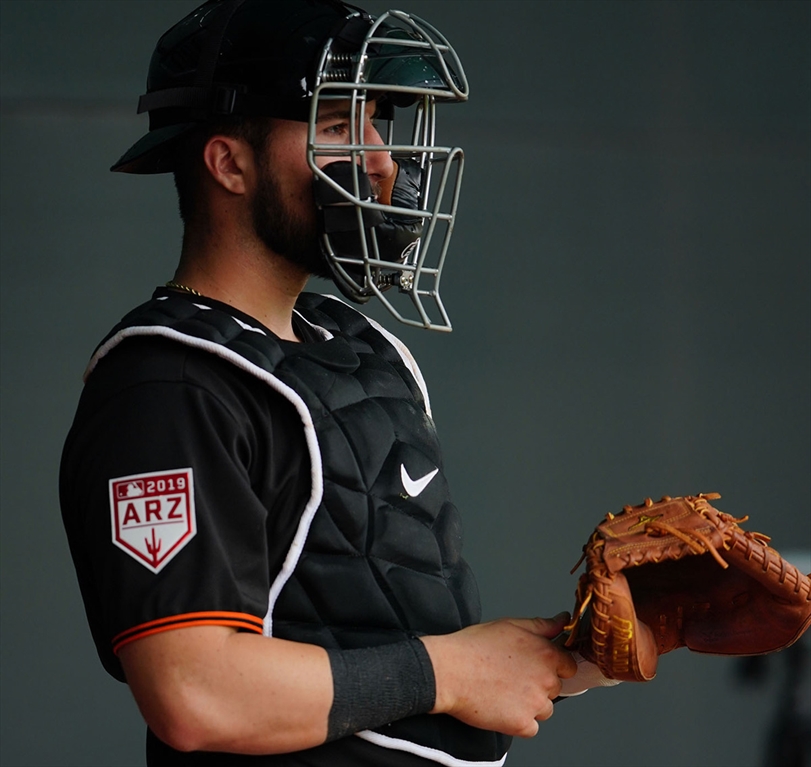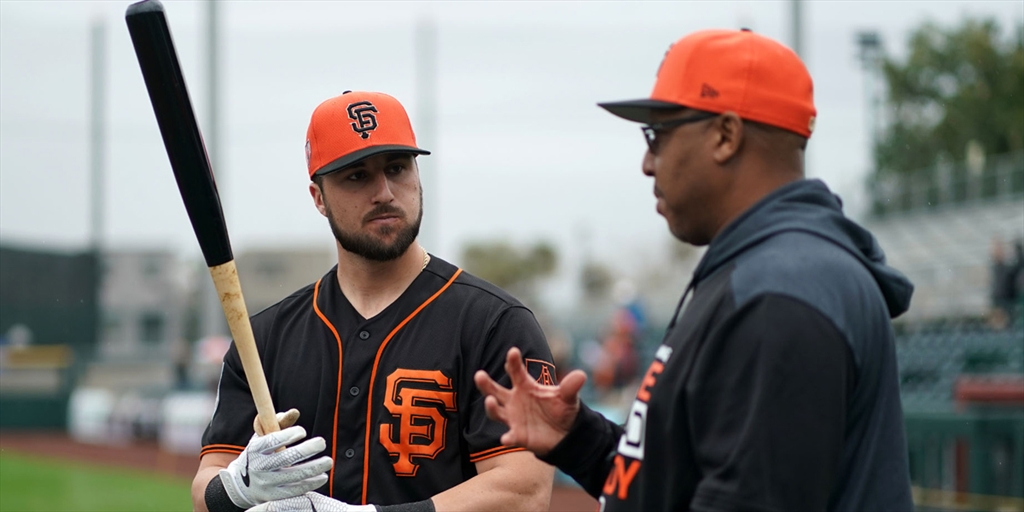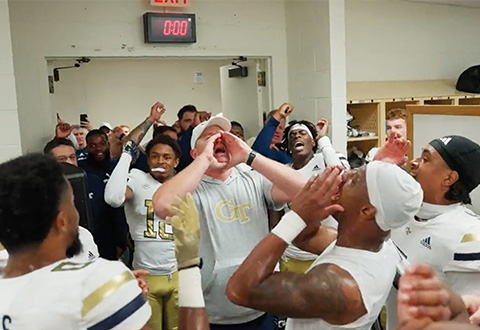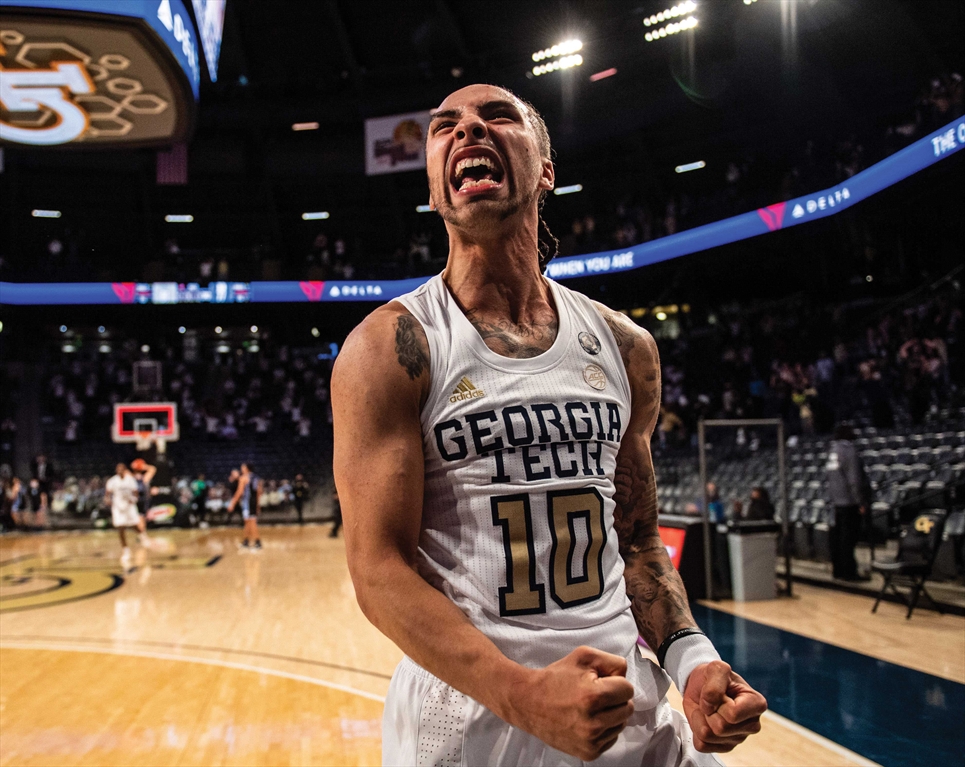High Prospects in the Low Minors
By: Bill Chastain, IM 79 | Categories: Sports

The Yellow Jackets are taking infield on a crisp January afternoon when Joey Bart lumbers into the stands at Russ Chandler Stadium. The hood of his black sweat suit hides his youthful face, save for the winter beard.
A year earlier, Bart wore a Tech uniform while preparing for a stellar junior campaign that saw him earn ACC Player of the Year honors. Today, he works toward clearing the high bar that has been set for him in the professional ranks.
The standout catcher banked a $7 million signing bonus after the San Francisco Giants made him the second overall pick of Major League Baseball’s 2018 June Amateur Draft. If Bart pans out as forecast, the money will continue to flow.
The league’s website, MLB.com, ranks the 6-foot-3, 220-pound native of Buford, Ga., as baseball’s No. 1 catching prospect.
Though well-heeled, Bart has not fallen for the trappings of the nouveau riche modern athlete. Gold chains, designer clothes and state-of-the-art electronics aren’t his style, though he’s smitten with the new truck he bought. He sheepishly explains, “My mom and dad have wanted to buy me a new car for a while, but I wanted to make it kind of a goal.”
Bart, who loves to hunt and fish, notes that the Chevy Durham LX2500 can pull a trailer, adding, “it’s beautiful.” Given Bart’s demeanor, one can picture a Labrador accompanying him in the “bonus” truck he’ll drive until rusted off the frame.
Bart understands the new world he’s entered. Being known, he must act accordingly. “You have to watch what you’re doing now, for sure,” he says. “When you comment on things, or put things out there on social media, you should definitely review it. Not that it’s bad, but it might be wrong in someone else’s eyes, even if it’s not bad in yours. You have to be aware of who's out there and the attention you get.”
Bart’s bonus ranks as the largest up-front bonus ever paid to a position player. Yet having the chance to chase his dream brought him his most- valued reward.
“Focusing on baseball only is nice for me,” Bart says. “I really like to play ball. I’m glad it’s worked out that I can focus only on baseball now.
“At Tech, in order for me to come out here and play, I had to go to class and get my grades right first. But now, baseball is my only job. Whatever I need to do to not get fired, that’s what I have to do. I have to take it very personally and seriously, or else, there’s people from all over the world who will come and take my spot.”
In his first professional action last year, Bart hit .294 with 13 homers, three triples and 15 doubles over 51 games between the Rookie-level Arizona League and Class A Short Season Salem-Keizer (Keizer, Ore.). He also threw out 39 percent of attempted base-stealers.
Despite his continued success at the next level, life in the low minor leagues turned out to be much different than what he experienced playing for a top NCAA program like Georgia Tech’s.
“We didn’t have air conditioning in the locker room,” Bart says. “We wore old, gross shorts with no drawstring in them, so they looked goofy. Here at Tech, it’s beautiful. Great locker room. But that’s just part of going through the minor leagues from what I’ve experienced so far in Arizona and Oregon.
“Arizona’s a lot nicer, but our spot in Oregon was one of those grinder-type places. I think it teaches you a lot, but it’s definitely a step down from Georgia Tech.”
Competing against a higher grade of player can rattle any prospect joining the professional ranks. Bart noticed the upgrade immediately.

“There are definitely more talented players in the minors,” Bart says. “But there are many who are still a little raw. I faced pitchers in the Arizona and Oregon leagues who are a little more talented and the ball comes out of their hand a little bit better. They have high upside, who can throw really hard. On the other hand, in college, a pitcher might not have great stuff, but he’s learned how to get people out.”
Bart is known for having a disciplined eye at the plate—a characteristic that’s often projectable for long-term success. This discipline forces opposing pitchers to throw strikes if they want Bart to swing.
Facing pitchers with better stuff, but many who struggled to find the strike zone, has adversely affected his plate discipline in his first stints in the minors.
“Having pitchers throwing the ball all over the place makes it tough,” Bart says. “My chase rates were pretty high in the Northwest League. At Tech, I felt like I had a good eye, and as soon as I got in pro ball, I felt like I lost it. Maybe it was just because the competition was a little better. The ball moved a lot more. It was just a different game. I definitely have to work on my plate discipline. I think it will improve.”
Catchers are regarded as the quarterbacks of the diamond. Accordingly, Bart calls his defense a priority. Tech coach Danny Hall allowed him to call his own pitches, which advanced his catching. And, he arrived to the professional ranks with sound mechanics, so he hasn’t had to make any radical changes. But he is working on how he receives the ball.
“I used to be a catcher who stuck the ball—catch it, stick it, throw it back to the pitcher,” Bart says. “Now we’re learning through analytics and things of that sort, that moving the ball around a little bit in the zone after you catch it—sort of pitch framing, is becoming more important. The numbers show that to get more strikes, you have to move it around. So that’s what I’m working on. I’ve just scratched the surface.”
Bart cites baseball legend Will Clark’s voice among those he could relate to amid the many voices offering advice. The former major-league All-Star hailed from Mississippi State and the Giants picked him with the second overall pick of the 1980 draft—just like Bart. Clark, who works in the Giants’ front office, is also an avid outdoorsman, so he and Bart discussed deer hunting, too.
“Mostly Clark talked about the kind of shoes that he was in being the second pick, and how he approached it,” Bart says. “Just how you listen to people and the things you take from what they say—things you need.”
Bart has also long admired current Giants catcher Buster Posey. He enjoyed meeting the perennial all-star and hopes to get to know him better, even though eventually Bart hopes to one day take Posey’s job.
“He’s been my favorite player for a long time,” says Bart, who noted he wouldn’t be talking up the Georgia Tech–Florida State baseball rivalry with Posey, who attended FSU. “You can’t talk smack to that guy. He’s done way too much.”
Bart eventually hopes to return to Tech to finish his degree in business administration, and he allowed that being close to having his degree offers him security about his future. But for the present, his only goal is to “put my head down and go full steam.”
“What the Giants want to do with me is out of my hands,” Bart says. “I’m just working as hard as I can. I’m going to try and climb the ladder as fast as I can.”


